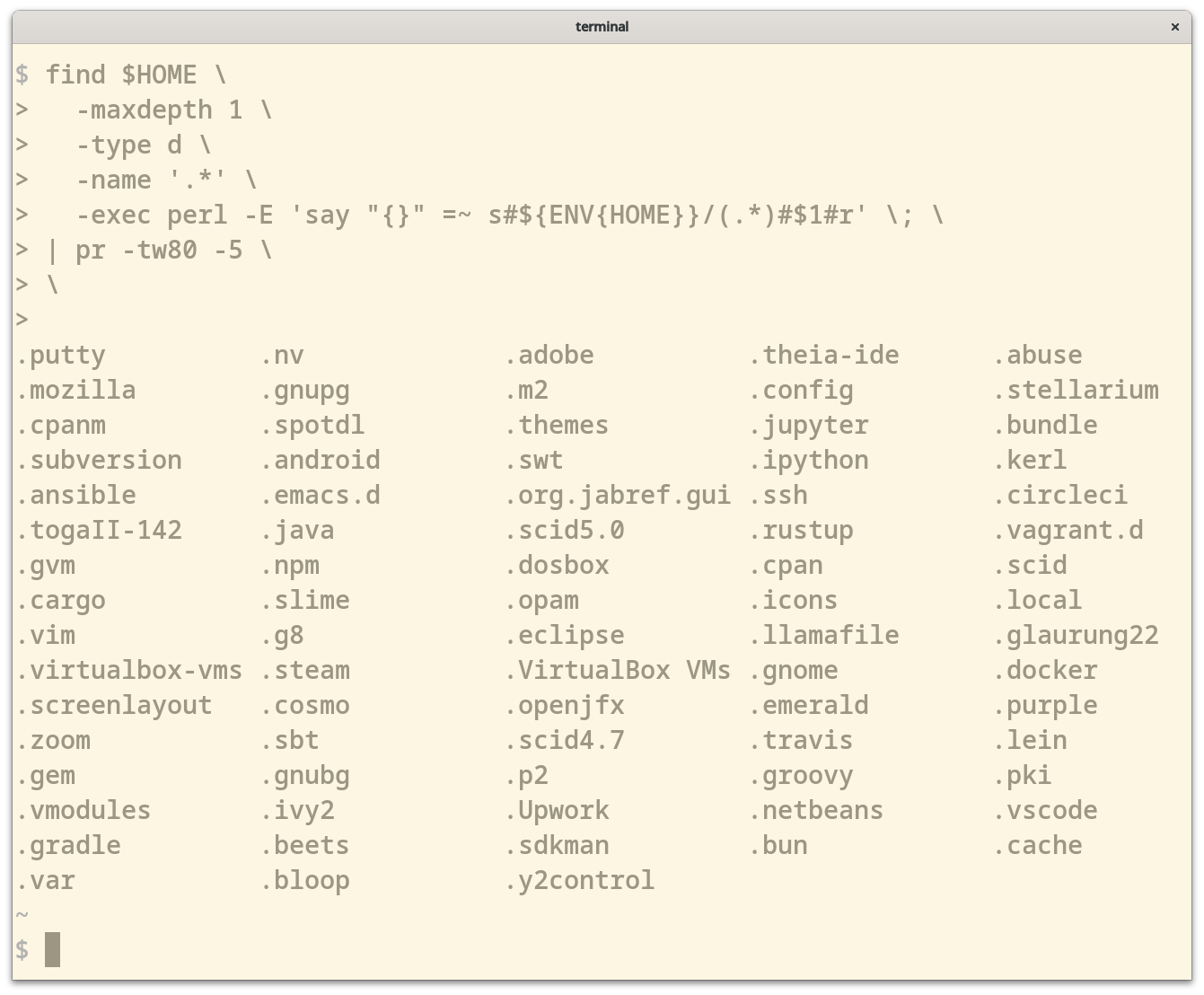bahmanm
Husband, father, kabab lover, history buff, chess fan and software engineer. Believes creating software must resemble art: intuitive creation and joyful discovery.
Views are my own.
- 21 Posts
- 89 Comments
I didn’t like the capitalised names so configured xdg to use all lowercase letters. That’s why
~/optfits in pretty nicely.You’ve got a point re
~/.local/optbut I personally like the idea of having the important bits right in my home dir. Here’s my layout (which I’m quite used to now after all these years):$ ls ~ bin desktop doc downloads mnt music opt pictures public src templates tmp videos workspacewhere
binis just a bunch of symlinks to frequently used apps fromoptsrcis where i keep clones of repos (but I don’t do work insrc)workspaceis a where I do my work on git worktrees (based offsrc)
Thanks! So much for my reading skills/attention span 😂
Which Debian version is it based on?
RE Go: Others have already mentioned the right way, thought I’d personally prefer
~/opt/goover what was suggested.
RE Perl: To instruct Perl to install to another directory, for example to
~/opt/perl5, put the following lines somewhere in your bash init files.export PERL5LIB="$HOME/opt/perl5/lib/perl5${PERL5LIB:+:${PERL5LIB}}" export PERL_LOCAL_LIB_ROOT="$HOME/opt/perl5${PERL_LOCAL_LIB_ROOT:+:${PERL_LOCAL_LIB_ROOT}}" export PERL_MB_OPT="--install_base \"$HOME/opt/perl5\"" export PERL_MM_OPT="INSTALL_BASE=$HOME/opt/perl5" export PATH="$HOME/opt/perl5/bin${PATH:+:${PATH}}"Though you need to re-install the Perl packages you had previously installed.

 3·1 year ago
3·1 year agoNB: I have never had the fortune to write Lisp in a professional setup.
For years, I used to use SBCL snippets for a whole set of automation tasks in my daily workflow, like updating git repos in batch, checking failing CI/CD pipelines per repo, organising my music collection, etc.
But gradually I switched to more specialised tools and, yes, Emacs Lisp to do what I needed to do. It just felt more ergonomic in my case.
The last time I seriously used SBCL was to solve some of Project Euler’s challenges back in 2018: https://github.com/bahmanm/euler-cl
Nowadays, I’ve got no non-elisp code left 🙂 🤷♂️

 4·1 year ago
4·1 year agoThis is fantastic! 👏
I use Perl one-liners for record and text processing a lot and this will be definitely something I will keep coming back to - I’ve already learned a trick from “Context Matching” (9) 🙂

 1·1 year ago
1·1 year agoThat sounds a great starting point!
🗣Thinking out loud here…
Say, if a crate implements the
AutomatedContentFlaggerinterface it would show up on the admin page as an “Automated Filter” and the admin could dis/enable it on demand. That way we can have more filters than CSAM using the same interface.
That was my case until I discovered that GNU tar has got a pretty decent online manual - it’s way better written than the manpage. I rarely forget the options nowadays even though I dont’ use
tarthat frequently.

 1·1 year ago
1·1 year agoI cross-posted the same questions on Matrix and got the answer there.
The hook I’m using is invoked before the minor modes are setup - that’s why it’s being overridden. The suggestion was to have a hook function for each minor mode that I want to control. It’s not clean but gets the job done.
Here’s the working snippet:
;;;;;;;;;;;;;;;;;;;;;;;;;;;;;;;;;;;;;;;;;;;;;;;;;;;;;;;;;;;;;;;;;;;;;;;;;;;;;;;;;; (defun bahman/helm-major-mode.hook () (display-line-numbers-mode -1) (puni-mode -1)) (add-hook 'helm-major-mode-hook #'bahman/helm-major-mode.hook) ;;;;;;;;;;;;;;;;;;;;;;;;;;;;;;;;;;;;;;;;;;;;;;;;;;;;;;;;;;;;;;;;;;;;;;;;;;;;;;;;;; (defvar bahman/display-line-numbers-mode.disabled-modes '(vterm-mode erlang-shell-mode) "Disable `display-line-numbers' for the specified modes.") (defun bahman/display-line-numbers-mode.hook () (when (seq-contains-p bahman/display-line-numbers-mode.disabled-modes major-mode) (display-line-numbers-mode -1))) (add-hook 'display-line-numbers-mode-hook #'bahman/display-line-numbers-mode.hook) ;;;;;;;;;;;;;;;;;;;;;;;;;;;;;;;;;;;;;;;;;;;;;;;;;;;;;;;;;;;;;;;;;;;;;;;;;;;;;;;;;; (defvar bahman/puni-mode.disabled-modes '(vterm-mode) "Disable `puni-mode' for the specificied modes.") (defun bahman/puni-mode.hook () (when (seq-contains-p bahman/puni-mode.disabled-modes major-mode) (puni-mode -1))) (add-hook 'puni-mode-hook #'bahman/puni-mode.hook)

 1·1 year ago
1·1 year agoThanks all for your feedback 🙏
I’m going to stick to “version 2” which, to my mind, reads more naturally. I’ll definitely consider the iterative suggestions for the sake of performance if I ever decide to submit a patch upstream. But for now, what I’ve got does the job for me dealing w/ sequences w/ less than 50 elements.
TBH I use whatever build tool is the better fit for the job, be it Gradle, SBT or Rebar.
But for some (presumably subjective) reason, I like GNU Make quite a lot. And whenever I get the chance I use it - esp since it’s somehow ubiquitous nowadays w/ all the Linux containers/VMs everywhere and Homebrew on Mac machines.

 1·1 year ago
1·1 year agoLove the attitude 💪 Let me know if you need help in your quest.

 2·1 year ago
2·1 year agoI see.
So what do you think would help w/ this particular challenge? What kinds of tools/facilities would help counter that?
Off the top of my head, do you think
- The sign up process should be more rigorous?
- The first couple of posts/comments by new users should be verified by the mods?
- Mods should be notified of posts/comments w/ poor score?

 9·1 year ago
9·1 year agoInteresting topic - I’ve seen it surface up a few times recently.
I’ve never been a mod anywhere so I can’t accurately think what workflows/tools a mod needs to be satisfied w/ their, well, mod’ing.
For the sake of my education at least, can you elaborate what do you consider decent moderation tools/workflows? What gaps do you see between that and Lemmy?
PS: I genuinely want to understand this topic better but your post doesn’t provide any details. 😅

 1·1 year ago
1·1 year agotests assertions top level
Noted. Makes sense.

 1·1 year ago
1·1 year agoYes, that’s essentially the snippet in my post 👍

 1·1 year ago
1·1 year agoOh!? And I was under the impression that the code reads more naturally than the initial version 😂
Let me try putting it in words and see if it makes sense to you:
Given sequences
seq1andseq2and sequence of sequencessequences,seq-intersect-pshould return non-nilif at least one pair of the input sequences have got an intersection.- If
seq1andseq2intersect returnt - Recursively check if
seq1intersects w/ any element insequences. If it does, returnt. Otherwise we knowseq1is safe to be ignored - no intersection whatsoever. - Recursively check if
seq2intersects w/ any element insequences. If they don’t, we knowseq2is safe to be ignored too. - Recursively check if any elements of
sequencesintersect w/ each other.
There’s no caching or optimisation in this version. So it’s always O(n2).
- If

 7·1 year ago
7·1 year agoThat single line of Lisp is probably
(defmacro generate-compiler (...) ...)which GCC folks call every time they decide to implement a new compiler 😆

 1·1 year ago
1·1 year agoThanks for the code review and feedback. Here’s a 2nd attempt: https://pastebin.com/WBqs9u8L
I essentially threw away my bloated Java/C#'esq implementation and started from scratch. Please let me know what you think 🙏









“Announcment”
It used to be quite common on mailing lists to categorise/tag threads by using subject prefixes such as “ANN”, “HELP”, “BUG” and “RESOLVED”.
It’s just an old habit but I feel my messages/posts lack some clarity if I don’t do it 😅